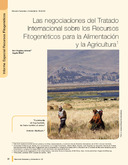| dc.contributor.author | Esquinas Alcázar, José | |
| dc.contributor.author | Hilmi, Angela | |
| dc.date.accessioned | 2019-08-30T16:43:05Z | |
| dc.date.available | 2019-08-30T16:43:05Z | |
| dc.date.issued | 2008-04 | |
| dc.identifier.issn | ISSN: 1659-1216 | ISSN |
| dc.identifier.uri | https://repositorio.catie.ac.cr/handle/11554/9172 | |
| dc.description | 10 páginas, ilustrado, 26 referencias. | |
| dc.description.abstract | El debate internacional que culmina con la negociación y la aprobación del Tratado Internacional sobre
los Recursos Fitogenéticos para la Alimentación y
la Agricultura (el Tratado), comenzó en la década de 1950, en el seno de la Organización de
las Naciones Unidas para la Agricultura y la
Alimentación (FAO, por sus siglas en inglés). Si
bien en un primer momento el debate era esencialmente de carácter técnico y científico, a partir de
la década de 1970 se centró en las implicaciones
económicas y sociales de la cuestión de los recursos fitogenéticos, y desde principios de los años
1980, en su naturaleza política, jurídica y ética.
El producto de estas primeras negociaciones fue
la aprobación en 1983 de un primer acuerdo no
vinculante: el Compromiso Internacional sobre los
Recursos Fitogenéticos (el Compromiso) y el establecimiento en la FAO de un primer foro intergubernamental permanente para continuar las negociaciones: la Comisión de Recursos Genéticos
para la Alimentación y la Agricultura (la Comisión)
que cuenta hoy con 167 países y la Comunidad
Europea. En 1992, se aprobó el primer acuerdo
vinculante sobre diversidad biológica en general:
el Convenio sobre Diversidad Biológica (CDB), el
cual despeja el camino para que el sector agrario
desarrolle ‑ en armonía con este convenio y sobre
la base del Compromiso ‑ su propio instrumento
jurídico vinculante, el Tratado, adoptado por la FAO
en 2001. En el momento en que se escribe este
artículo, el Tratado ha sido ratificado por 115 países y la Comunidad Europea, y la primera reunión
de su Órgano Rector tuvo lugar en Madrid en junio
de 2006. | |
| dc.description.abstract | What would later culminate with
the negotiation and approval of the International
Treaty on Plant Genetic Resources for Food and
Agriculture (the Treaty), began in the 1950’s as
an international debate from within the Food and
Agriculture Organization of the United Nations
(FAO). Initially discussions were technical and
scientific, but by the 1970’s, they had focused on
the economic and social implications of the plant
genetic resources in question. The 1980’s saw
the debate develop politically, legally and ethically.
As a result of these early negotiations, in 1983,
the first non-binding agreement, the International
Undertaking on Plant Genetic Resources (IU) was
approved. Also stemming from the initial debate
is the 1983 establishment of the first perma nent intergovernmental forum, the Commission on
Genetic Resources for Food and Agriculture (the
Commission), to continue discussions and negoti ations. Today, the Commission includes 167 coun tries and the European Community. In 1992, the
approval of the first binding agreement on biological
diversity in general, the Convention on Biological
Diversity (CBD), cleared the way for the agricul tural sector to develop its own international binding
instrument, in harmony with the CBD and based on
the principles of the International Undertaking. This
legal instrument, the Treaty, was adopted by FAO
in 2001. To date 115 countries and the European
Community have ratified the Treaty. | |
| dc.format.mimetype | pdf | |
| dc.language.iso | es | es_ES |
| dc.publisher | CATIE, Turrialba (Costa Rica) | es_ES |
| dc.publisher | CATIE, Turrialba (Costa Rica) | |
| dc.relation.ispartof | Recursos Naturales y Ambiente Número 53 (Abril 2008), páginas 20-29 | |
| dc.rights | info:eu-repo/semantics/openAccess | es_ES |
| dc.rights | info:eu-repo/semantics/openAccess | |
| dc.rights.uri | https://creativecommons.org/licenses/by-nc-nd/4.0/ | |
| dc.subject | RECURSOS GENETICOS VEGETALES | |
| dc.subject | CONSERVACION DE LOS RECURSOS | |
| dc.subject | SEGURIDAD ALIMENTARIA | |
| dc.subject | ACUERDOS INTERNACIONALES | |
| dc.subject | CONSERVACION | |
| dc.subject | CONSERVACION DE LA NATURALEZA | |
| dc.title | Las negociaciones del Tratado Internacional sobre los Recursos Fitogenéticos para la Alimentación y la Agricultura | es_ES |
| dc.title.alternative | The negotiation of the International Treaty
on Plant Genetic Resources for Food and
Agriculture. | |
| dc.type | Artículo | es_ES |
| dc.journal.issueNumber | 53 | |
| dc.journal.pages | 20-29 | |



